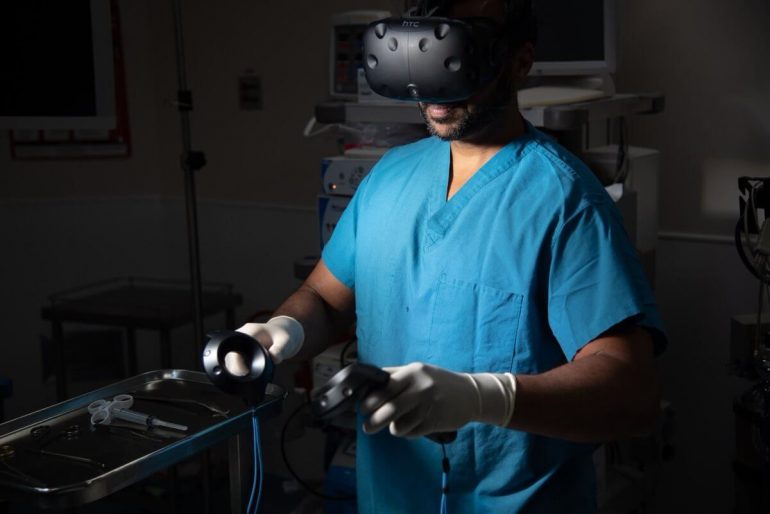Orthopaedic VR software company, Precision OS, is currently working with 10 medical institutions across North America, bringing its technology to classrooms.
Surgeon trainees (or residents) are using Precision OS’ high-fidelity virtual reality orthopaedic surgery training platform to get realistic practice with surgeries.
“This is only the beginning of what may be a complete disruption of how we learn and train surgeons.”
“Virtual reality has the potential to positively impact and advance the way surgery residents are trained by offering more frequent and in-depth operating room experience,” said Dr. Joaquin Sanchez-Sotelo, professor of orthopaedic surgery at the Mayo Clinic. “We are looking forward to exploring this technology and introducing the Precision OS platform to our residents and fellows.”
The Vancouver-based company stated that it “envisions a future where surgeon trainees everywhere can receive the highest quality orthopaedic training with real-time feedback, augmenting the cadaveric experience.”
Virtual reality allows residents to have an immersive surgical experience without being distracted by real-world circumstances, and without risk of harm to real-life patients. Putting on the virtual reality headset simulates an operating room, with virtual tools.
RELATED: Calgary hospital first in Canada to use virtual reality to treat pain
Precision OS noted that one thing that makes it unique is the variety of training modules that it offers. Residents are able to practice procedures under different, changing conditions to parallel potential complications in real surgeries. Conditions, including arthritis and age, can be changed to ensure that residents are exposed to everything from minor complications to critical mistakes. The virtual patient is even responsive in ways that real-life patients would be.
The platform also offers detailed, user-specific metric feedback to help surgical residents assess their performance and surgical skills, helping them “reach peak performance through repeated practice and personalized learning.”
“VR training is the way of the future,” noted Dr. Peter MacDonald, professor and head section of orthopaedics at the University of Manitoba. “It will enhance patient care by having a more skilled and well-prepared surgeon. The software and training unit of Precision OS is brilliantly put together and is a major advance for our residency and fellowship training program.”
Several hundred surgical residents, spanning the 10 medical institutions, currently have access to Precision OS’s VR training.
Precision OS is currently being used for training at:
- The Mayo Clinic
- The University of British Columbia
- The Sunnybrook Hospital at the University of Toronto
- The Pan Am Clinic Foundation
- Western University
- McGill University
- Dalhousie University
- The Boston Shoulder Institute
- The University of Mississippi Medical Center
The company is also working with Dr. John Costouros, an orthopaedic surgeon and assistant professor at Stanford University, to trial its virtual reality with soon-to-be graduating surgeons. It noted that this partnership marks the first time this quality of high-fidelity and immersive virtual reality technology will be used for such intensive surgical training.
RELATED: VR could help treat Parkinson’s, schizophrenia, autism finds University of Waterloo report
In November, Precision OS closed $2.3 million in funding to help it build this platform. The round was led by AO Invest, the venture capital arm of a Swiss orthopaedic education and research organization.
“This is only the beginning of what may be a complete disruption of how we learn and train surgeons,” stated Dr. Danny Goel, CEO and co-founder of Precision OS, and an orthopedic surgeon at the University of British Columbia. “To be at the cutting edge of introducing this technology, with a focus on demonstrating its value, is a social responsibility for us at Precision OS. Virtual reality is an exciting and innovative area of technology that can influence surgeons and their patients around the world.”
Feature image courtesy Precision OS via Twitter


